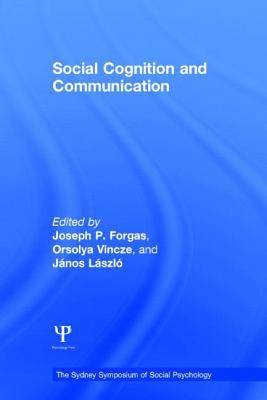
- Afhalen na 1 uur in een winkel met voorraad
- Gratis thuislevering in België vanaf € 30
- Ruim aanbod met 7 miljoen producten
- Afhalen na 1 uur in een winkel met voorraad
- Gratis thuislevering in België vanaf € 30
- Ruim aanbod met 7 miljoen producten
Social Cognition and Communication
Omschrijving
Language is the essence of interpersonal behavior and social relationships, and it is social cognitive processes that determine how we produce and understand language. However, there has been surprisingly little interest in the past linking social cognition and communication. This book presents the latest cutting-edge research from a select group of leading international scholars investigating the how language shapes our thinking, and how social cognitive processes in turn influence language production and communication. The chapters represent diverse perspectives of investigating the links between language and communication, including evolutionary, linguistic, cognitive and affective approaches as well as the empirical analysis of written and spoken narratives. New methodologies are presented including the latest techniques of text analysis to illuminate the psychology of individual language users, and entire cultures and societies.
The chapters address such questions as how are cognitive and identity processes reflected in language? How do affective states influence language production? Are political correctness norms in language use effective? How do partners manage to accommodate to each other's communicative expectations? What is the role of language as a medium of interpersonal and intergroup influence? How are individual and cultural identities reflected in, and shaped by narratives in literature, school texts and the media?
The book is aimed at all students, researchers and laypersons interested in the interplay between thinking and communication, and should be required reading for all professionals who use language in their everyday work to interact with people.
Specificaties
Betrokkenen
- Uitgeverij:
Inhoud
- Aantal bladzijden:
- 354
- Taal:
- Engels
- Reeks:
Eigenschappen
- Productcode (EAN):
- 9781848726635
- Verschijningsdatum:
- 31/07/2013
- Uitvoering:
- Hardcover
- Formaat:
- Genaaid
- Afmetingen:
- 183 mm x 257 mm
- Gewicht:
- 639 g

Alleen bij Standaard Boekhandel
Beoordelingen
We publiceren alleen reviews die voldoen aan de voorwaarden voor reviews. Bekijk onze voorwaarden voor reviews.










